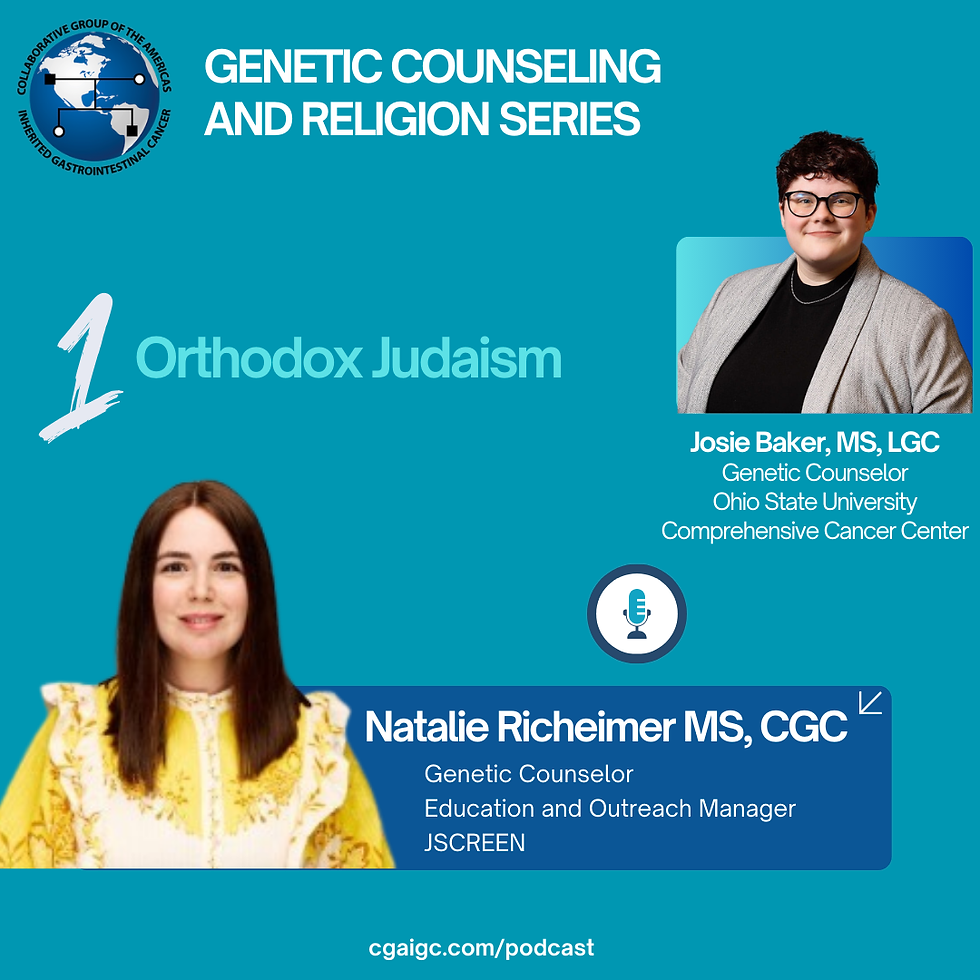Hear about the key role of endoscopic surveillance in patients with Hereditary GI Cancer Syndromes in a webinar in partnership with the American College of Gastroenterology (ACG)
- CGA-IGC
- Oct 11, 2024
- 2 min read

In the fifth webinar of our 2024 series about hereditary gastrointestinal cancer syndromes in partnership with ACG, Gautam Mankaney, MD, a Gastroenterologist and hereditary GI cancer expert from Virginia Mason Medical Center, discussed the importance of endoscopy in managing key hereditary GI cancer syndromes.
The webinar started with a review of Hereditary cancer and considerations for genetic testing and risk stratification. Dr. Mankaney, an expert in hereditary GI cancer syndromes, then discussed the general principles of endoscopic planning and the role of endoscopy in cancer prevention.
The rest of the webinar covered endoscopic surveillance and intervention of two of the most prominent hereditary GI cancer syndromes, Lynch Syndrome and familial adenomatous polyposis (FAP) as well as the management of hamartomatous Syndromes. Interwoven amongst this discussion, Dr. Mankaney highlighted endoscopic guidelines and best Practices as well covered endoscopic techniques including EMR and chromoendoscopy.
Dr. Mankaney covered FAP surveillance focusing on screening of the stomach, small intestine and colorectum. He provided pearls on the high-risk features endoscopist should look for and the role of endoscopic intervention. He also discussed the risk of cancer in lynch syndrome, based on genotype and that high quality endoscopy could reduce the high rate of interval cancers for these individuals.
Finally, the moderators, Julie Yang, MD and Sara Safadi, MD, facilitated questions from the audience This led to the discussion of research and the nuances of proximal polyposis as well as the possible use of non-invasive screening and small bowel surveillance in hamartomatous syndromes.
This webinar highlighted that Hereditary GI cancer syndromes require ongoing surveillance, particularly through the use of endoscopy. By adhering to best practices and using the latest endoscopic techniques, healthcare providers can dramatically reduce the risk of cancer for high-risk individuals. The combination of early detection, careful polyp management, and a comprehensive care team ensures that patients can live healthier, longer lives despite their genetic predispositions.
Many thanks to our wonderful speaker and moderators for their time!
If you did not have the chance to join us or would like to view parts of it again, you can now watch it on-demand as a current CGA-IGC member. If you are not a member yet, you can join here.
Please join us for the next CGA-IGC webinar on "Hot Topics in Hereditary GI Cancer Syndromes."
___________________________________________________________________________
Our webinars are a valuable member benefit, and we encourage you to sign up as a member so you can join the live webinars and access our earlier webinar series on demand!
Also, looking for other educational resources? Toolkits? Podcasts?
If you enjoy webinars, you may like the CGA-IGC Podcast Series (Seasons 3, 4, 5, 6 & 7) presented by the CGA-IGC Education Committee. Or explore our Expert Approach to Hereditary Gastrointestinal Cancers podcast series (Seasons 1 and 2).
We're also on Spotify! ___________________________________________________________________________________




Comments